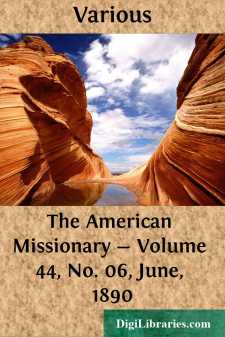Categories
- Antiques & Collectibles 13
- Architecture 36
- Art 48
- Bibles 22
- Biography & Autobiography 813
- Body, Mind & Spirit 142
- Business & Economics 28
- Children's Books 17
- Children's Fiction 14
- Computers 4
- Cooking 94
- Crafts & Hobbies 4
- Drama 346
- Education 46
- Family & Relationships 57
- Fiction 11829
- Games 19
- Gardening 17
- Health & Fitness 34
- History 1377
- House & Home 1
- Humor 147
- Juvenile Fiction 1873
- Juvenile Nonfiction 202
- Language Arts & Disciplines 88
- Law 16
- Literary Collections 686
- Literary Criticism 179
- Mathematics 13
- Medical 41
- Music 40
- Nature 179
- Non-Classifiable 1768
- Performing Arts 7
- Periodicals 1453
- Philosophy 64
- Photography 2
- Poetry 896
- Political Science 203
- Psychology 42
- Reference 154
- Religion 513
- Science 126
- Self-Help 84
- Social Science 81
- Sports & Recreation 34
- Study Aids 3
- Technology & Engineering 59
- Transportation 23
- Travel 463
- True Crime 29
The American Missionary - Volume 44, No. 06, June, 1890
by: Various
Categories:
Description:
Excerpt
American Missionary Association.
The Rooms of the American Missionary Association are now in the Bible House, New York City. Correspondents will please address us accordingly.
Visitors will find our Rooms on the sixth floor of the Bible House, corner Ninth Street and Fourth Avenue; entrance by elevator on Ninth Street.
DR. STORRS, ON THE NEGRO PROBLEM.
Not long since Rev. R.S. Storrs, D.D., preached a sermon in his own pulpit, presenting the claims of the American Missionary Association for the annual collection in its behalf from the Church of the Pilgrims, Brooklyn, N.Y. This sermon appeared in print in one of the daily papers, and attracted the attention of a benevolent gentleman deeply interested in the Christian education of the colored people, who was so impressed with the great value of the address, that he has furnished the Association with the means to print a large edition for general circulation. This we have done, and we presume that already, many of our readers have had the opportunity of reading this eminently wise and timely utterance on one of America's greatest problems. Should any one desire an extra copy, we will gladly furnish it on application.
Although the discourse has had large circulation, we cannot resist the temptation to extract a few of its forcible utterances on some very important points.
Permanent popular liberties have their only sure foundation in sound moral conditions practically universal. We must secure these among those to whom we have given the ballot, and who are to be henceforth citizens with ourselves. Otherwise, we are [pg 172]building our splendid political house on the edges of the pestilential swamp from which fatal miasmatic odors are rising all the time. Yes, we are building our house on piles driven into the thick ooze and mud of the pestilential swamp itself. We are building our cities, which we think are so splendid, and which are so in fact, as men built Herculaneum and Pompeii, on a shore which ever and anon trembled with earthquake, over which was hung the black flag of Vesuvius, and down upon which rolled, in time, the lava floods that burned and buried them.
We have got to meet this immense problem, which is not far off, but right at hand; which is not a problem of theory, or of distant history, but of practice and fact; and which concerns not the well-being alone, but the very life of the nation. Noble men and women at the South are engaged in it already, with all their hearts; and we must help, mightily! It would be the craziest folly of the age for us to be indifferent to it.
Some men may say, perhaps, "But this is a work that cannot be done. It is too radical and vast to be hopefully attempted." Nonsense! There is no work for the kingdom of God and the glory of His name, which cannot be done! With the Gospel in our hand, we can do everything.
There has been a good beginning made already. This Society, to which we are to contribute to-day, the American Missionary Association, has four established colleges, three of which are entirely supported by itself, have been founded by it and are carried on by it; and the fourth very largely so....












